
Sons and Lovers is a 1913 novel by the English writer D. H. Lawrence, originally published by B.W. Huebsch Publishers. The Modern Library placed it ninth on their list of the 100 best novels of the 20th century. While the novel initially received a lukewarm critical reception, along with allegations of obscenity, it is today regarded as a masterpiece by many critics and is often regarded as Lawrence's finest achievement.

The Bell Jar is the only novel written by the American writer and poet Sylvia Plath. Originally published under the pseudonym "Victoria Lucas" in 1963, the novel is semi-autobiographical, with the names of places and people changed. The book is often regarded as a roman à clef because the protagonist's descent into mental illness parallels Plath's own experiences with what may have been clinical depression or bipolar II disorder. Plath committed suicide a month after its first UK publication. The novel was published under Plath's name for the first time in 1967 and was not published in the United States until 1971, in accordance with the wishes of both Plath's husband, Ted Hughes, and her mother. The novel has been translated into nearly a dozen languages. The novel, though dark, is often read in high school English classes.

Rilla of Ingleside (1921) is the eighth of nine books in the Anne of Green Gables series by Lucy Maud Montgomery, but was the sixth "Anne" novel in publication order. This book draws the focus back onto a single character, Anne and Gilbert's youngest daughter Bertha Marilla "Rilla" Blythe. It has a more serious tone, as it takes place during World War I and the three Blythe boys—Jem, Walter, and Shirley—along with Rilla's sweetheart Ken Ford, and playmates Jerry Meredith and Carl Meredith—end up fighting in Europe with the Canadian Expeditionary Force.

Sula is a 1973 novel by Nobel Prize-winning author Toni Morrison, her second to be published after The Bluest Eye (1970).

"...And Ladies of the Club" is a novel, written by Helen Hooven Santmyer, about a group of women in the fictional town of Waynesboro, Ohio who begin a women's literary club, which evolves through the years into a significant community service organization in the town.

Dacia Maraini is an Italian writer. She is the daughter of Sicilian Princess Topazia Alliata di Salaparuta, an artist and art dealer, and of Fosco Maraini, a Florentine ethnologist and mountaineer of mixed Ticinese, English and Polish background who wrote in particular on Tibet and Japan. Maraini's work focuses on women’s issues, and she has written numerous plays and novels. She has won awards for her work, including the Formentor Prize for L'età del malessere (1963); the Premio Fregene for Isolina (1985); the Premio Campiello and Book of the Year Award for La lunga vita di Marianna Ucrìa (1990); and the Premio Strega for Buio (1999). In 2013, the documentary I Was Born Travelling about her life portrayed the story of her imprisonment in a concentration camp in Japan, to the legendary journeys around the world with her partner Alberto Moravia, her close friends Pier Paolo Pasolini and opera singer Maria Callas.
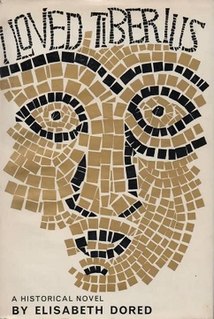
Jeg elsket Tiberius is a 1959 romance novel by Elisabeth Dored. It was first translated into English by Naomi Walford in Great Britain by Methuen and United States by Pantheon Books in 1963 under the name I Loved Tiberius. The novel was written as a careful reappraisal of the contemporary sources, placing Julia and Tiberius in a more positive light. The novel is set in 1st century BC Rome, centred on Julia the Elder, the daughter of Augustus and her life right up until her death. The novel begins with Julia's birth and her mother being forbidden to see her. The plot is mainly focused on Julia's love life, notably her relationship with her stepbrother, Tiberius.
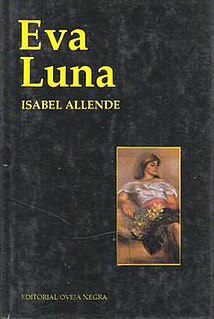
Eva Luna is a novel written by Chilean novelist Isabel Allende in 1987 and translated from Spanish to English by Margaret Sayers Peden.
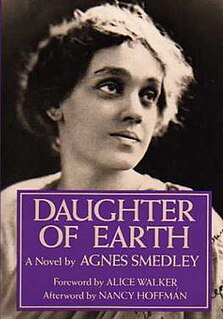
Daughter of Earth (1929) is an autobiographical novel by the American author and journalist Agnes Smedley. The novel chronicles the years of Marie Rogers's tumultuous childhood, struggles in relationships with men, time working with the Socialist Party, and involvement in the Indian independence movement.

Lina Poletti, born Cordula Poletti, was an Italian feminist, often described as being beautiful and rebellious, prone to wear men's clothing, and who is best known today for her affairs with writer Sibilla Aleramo and actress Eleonora Duse. In the book, Le lesbiche nell'italia del primo Novecento, Poletti is credited with being one of the first women in Italy to openly declare her lesbianism, without regret.

Portrait in Sepia is a 2000 novel by Isabel Allende. The novel can be thought of a sequel to Allende's Daughter of Fortune as it follows Eliza Sommers' granddaughter - Aurora del Valle.

Olive Kitteridge (2008) is a novel by American author Elizabeth Strout. It presents a portrait of the title character and a number of recurring characters in the coastal town of Crosby, Maine. It takes the form of 13 short stories that are interrelated but discontinuous in terms of narrative. It won the 2009 Pulitzer Prize for Fiction and was a finalist for the 2008 National Book Critics Circle Award. HBO produced a four-part mini-series, based on the novel, featuring Frances McDormand in the title role, which aired on November 2 and 3, 2014. The series won eight awards at the 2015 Primetime Emmys.
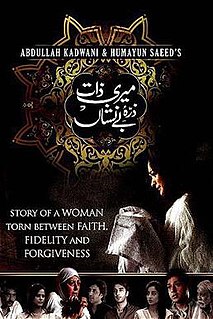
Meri Zaat Zarra-e-Benishan is a Pakistani drama serial, directed by Babar Javed, and produced by Abdullah Kadwani and Humayun Saeed. It is based on Umera Ahmad's novel of the same name. It is an emotional story of a girl named Saba and her daughter Sara. The drama became very popular upon its release. In 2001 The serial featured an ensemble cast consisting of Samiya Mumtaz, Samina Peerzada, Sarwat Gillani, Mehreen Raheel, Faisal Qureshi, Adnan Siddiqui, Imran Abbas, Ismat Zaidi and Humayun Saeed.
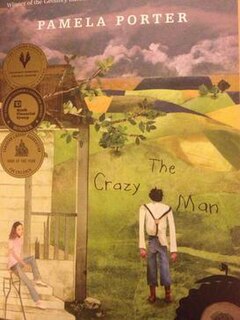
The Crazy Man is a 2005 Canadian children's novel written by Pamela Porter. This realistic family novel told in free verse has received many awards and was selected for the Governor General’s Literary Award. The story is about a girl named Emaline who lives on a farm. Emaline's family falls apart after a terrible tractor accident. After chasing her beloved dog, Emaline's father accidentally runs over her leg with a tractor leaving her permanently disabled. Because of guilt, Emaline's father shoots her dog, Prince, and ends up leaving Emaline and her mother on their own. The narrative follows Emaline as she deals with prejudice, fear, her disability, and the absence of her father.
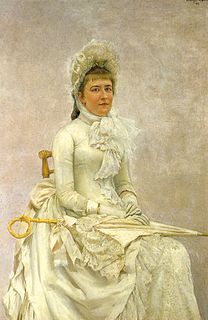
Lydia Welti Escher, was a Swiss patron of the arts and the daughter of Augusta Escher-Uebel (1838–1864) and Alfred Escher (1819–1882), among others the founder of the Gotthardbahn. Lydia Escher was one of the richest women of Switzerland in the 19th century, patron of the arts and established the Gottfried Keller Foundation.
The Neapolitan Novels are a 4-part series by the Italian novelist Elena Ferrante, translated by Ann Goldstein and published by Europa Editions. It includes the following novels: My Brilliant Friend (2012), The Story of a New Name (2013), Those Who Leave and Those Who Stay (2014), and The Story of the Lost Child (2015). The series has been characterized as a bildungsroman, or coming-of-age story. In an interview for the Harper's Magazine, Elena Ferrante stated that she considers the four books to be "a single novel", published serially for reasons of length and duration. The series has sold over 10 million copies in 40 countries.
Teresa is an 1886 novel by the Italian writer Neera, real name Anna Radius Zuccari. The story of the heroine Teresa Caccia has parallels with Zuccari's own early life.

Prothom Protishruti, also spelled Pratham Pratishruti, is a 1964 Bengali novel by Ashapurna Devi. Considered to be Devi's magnum opus, it tells a story of Satyabati who was given away in marriage at the age of eight to maintain the social norms, and was kept under strict surveillance of brahmanical regulations. The novel narrates Satyabati's struggle to fight against family control, mental violence of the polygamy system, and social prejudices in patriarchal society. It won Rabindra Puraskar (1965) and Jnanpith Award (1976).

Rosa Rosà was a writer and author associated with the inter-war Italian Futurist movement. She is renowned for her first short novel, Una donna con tre anime.



















